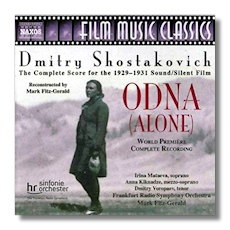
The Internet's Premier Classical Music Source
Related Links
- Shostakovich Reviews
- Latest Reviews
- More Reviews
-
By Composer
-
Collections
DVD & Blu-ray
Books
Concert Reviews
Articles/Interviews
Software
Audio
Search Amazon
Recommended Links
Site News
 CD Review
CD Review
Dmitri Shostakovich

Odna, Op. 26 (Alone)
première Recording of the Complete Film Score
(Reconstruction by Mark Fitz-Gerald)
- Irina Mataeva (soprano)
- Anna Kiknadze (mezzo soprano)
- Dmitry Voropaev (tenor)
- Mark van Tongeren (overtone singer)
- Barbara Buchholz (theremin)
Vokalensemble der HfMDK Frankfurt
Frankfurt Radio Symphony Orchestra/Mark Fitz-Gerald
Naxos 8.570316
Musicologists and musicians in Soviet Russia, and for that matter, post-Soviet Russia, have been remiss in unearthing the film scores of Prokofieff, Shostakovich, Khachaturian and other composers in their sphere. The 1929-31 Odna (Alone), Shostakovich's second film score, was restored by English conductor and musicologist Mark Fitz-Gerald, and this Naxos offering is the première recording of the complete original score. The album notes and promotional material make a point of the fact that his restoration was sanctioned by the composer's widow, Irina. I don't think her approval actually matters though. Irina Shostakovich was the composer's third wife, a woman he married when she was twenty-seven. The Odna score was written more than thirty years before their marriage, before she was born then. She has written eloquently about Shostakovich and his works and presumably knows a great deal about them. Apparently, she was instrumental in aiding Fitz-Gerald in his restoration effort, too. But I am thankful that Mark Fitz-Gerald took on the task of reconstructing this score, and I'm not sure anyone can determine how true it is to the original soundtrack, which was lost. Certainly it has all the marks of the real thing.
His effort has produced a score lasting 79:56, with the addition of two numbers not included in the film – the opening Overture and a prelude. Also, the score here employs several exotic instruments specified by Shostakovich – the barrel organ, theremin (an early electronic instrument), banda (eight brass band instruments) – and various vocal effects (try track 17, the opening number depicting Kuzmina's arrival in the Altai Steppes, where throat-singing is employed most colorfully). And the orchestration here is absolutely Shostakovian throughout. On the whole, I'd say Fitz-Gerald has done a splendid job.
There is so much of great interest in the score that it's hard to know where to begin. Track 20 features imaginative, albeit barren-sounding wind writing: contrabassoon, bassoon and other wind instruments convey a sense of desolation, but with a sense of irony, even humor. The unaccompanied lullaby (track 27) is haunting and well sung by Anna Kiknadze. The brash and grim "The village Soviet chairman waking up" (track 29) is a most deliciously dark portrayal: the downward brass glissandos are humorously sassy and chilling at the same time. The instrumental and electronic effects in "A snow storm starts to build" (track 38) are truly something to behold, but the anxious music that follows is both exciting and terrorizing. True, some of the early numbers are bombastic or trite (#5 – "March The Street"; #7 – "Galop and Song"), but even these have their attractive moments. On the whole, one can say the score gets better as it progresses, not that it begins in mediocrity: it moves from the imaginative and colorful to the truly inspired and profound. This is great music and by far the best film score Shostakovich ever wrote, far better than the highly praised, "The New Babylon," his first effort in the film genre.
I've already spoken of mezzo Anna Kiknadze, but the other singers in the production are also excellent, especially Irina Mataeva, who sang Natasha in Prokofieff's War and Peace in several of the performances at the Met in 2007-08 season. Fitz-Gerald's conducting is vital and full of spirit and color, not least because of the committed playing by the Frankfurt Radio Symphony Orchestra. In the past, I have opined that Shostakovich's film scores were largely inferior efforts. I may have to change that assessment if further excavations into this still largely unexplored corner of his output reveal music on this level. The Naxos sound is excellent and the notes by John Riley are informative and well researched. Naxos provides 48 tracks and gives titles for each one in the booklet. Highest recommendations on all counts and one of the finest recordings of its type I have ever encountered!
Copyright © 2008, Robert Cummings




















